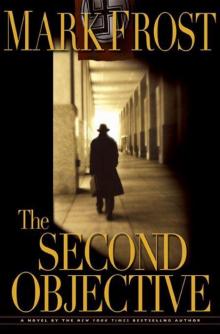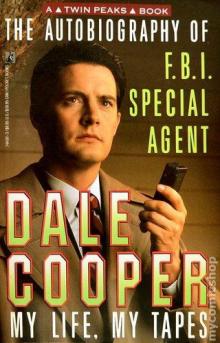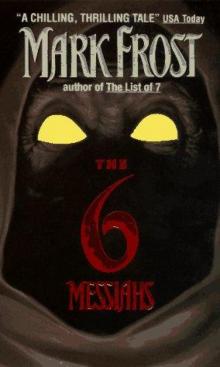- Home
- Mark Frost
The List of Seven Page 18
The List of Seven Read online
Page 18
“What did the letter say?”
“Predominantly innocent schoolboy chat—his daily routines recounted in prosaic detail, victories and tribulations in the classroom and on the playing fields, anecdotes about his colorful collection of classmates, what to expect of school myself, the clubby whys and wherefores of getting on with both teachers and chums—all in the confident tone of the wiser, worldlier brother advising a young charge on the eve of embarking on his own educational career. It assumed a comfortable familiarity that played as if we’d known each other all our lives. Friendly, generous, evenhanded, more than a little funny—in short, precisely the sort of letter I had dreamed about receiving from the idealized older brother I’d imagined. Nothing overt that would have upset my parents if they had ever found it, which I took every precaution to prevent. There was no self-pity, bemoaning our parents’ abandonment of him. No complaints at their lack of interest. To the contrary, he wrote about them with the greatest consideration and affection, grateful for the opportunities they had given him at this wonderful school, how proud he hoped to one day make them, how he longed to repay their kindnesses to him a thousandfold. Not until the last paragraph did he conceal the hook around which he had spun the fiction. The ingenuousness, the absence of rancor toward my parents, his heartfelt openness toward our mutual discovery—all evidence of a clever, cunning, even exceptional personality. It wasn’t until this last reference that the full extent of his malignant genius was manifest.”
“What was it?”
“‘Although it seems clear that we must face all the difficult trials of our lives alone, just to know that you are alive, my brother, gives me the secret strength I have always sought to carry on.’” Sparks spoke the words quietly, with grave exactitude. “The stoic bravery, the hinted-at but unnamed difficult trials—how magnified, how operatic, they became in my imagination—and the suggestion that I could in my small, seven-year-old way somehow ease the pain of this shining exemplar was irresistible to my freshly minted mind. I was far too green to resist such an appeal. It whispered that he must know my capacities better than I knew myself. That in time, in his wisdom, he would reveal them to me, leading me to the discovery of my true identity, which I of course hoped would be in partnership with him, united against the world. If he had asked me even then, in that first letter, I would have thrown myself onto a bayonet.”
“How did you respond?”
“He ended with instructions on how, if I so desired, I might safely write him back. The school had strict orders from my parents to intercept and return to them all of Alexander’s arriving correspondence. I was to address the letter to a classmate of his—a fiercely devoted cadre of boys had served him unswervingly since his arrival; their number increased every year—and the letter would be discreetly passed on. Of course, the clandestine nature of it only served to amplify my enthusiasm: I wrote him back at once, emptying the contents of my heart; the longing I had for just such a champion in my life came running out of me like spring water. I made a sweet, simple fool of myself.”
“You were only a boy,” said Doyle.
Sparks showed himself no such clemency. His eyes were reduced to black pinpricks of self-directed rage. Draining his brandy, he promptly called for another. “I’ve never told any of this to another soul. Not a word.”
Doyle knew Jack would accept no solace from the hollow sympathies he had to offer. Sparks’s drink arrived. He fortified himself before continuing.
“I sent my letter to him. He of course anticipated my letter and had seen to it that arrangements allowing an exchange to continue were already in place—his writing back to me was problematic; sending it directly was out of the question. With an embroidered account of parental cruelty, he had recruited one of his adjutant’s cousins, a quiet, reliable youth who lived in the village near our home. Under his cousin’s signature, the man would receive Alexander’s letters—which, once the dam broke, arrived at a steady rate of at least two a week—bicycle out to our estate, and leave them in a biscuit tin I had buried near an ancient oak, a landmark on our property that I frequented, well out of sight from the main house.
“So my correspondence with my brother began. It was from the start voluminous, the contents academically vigorous and far-reaching. Alexander’s interest in and ability to penetrate the deeper workings of the world, and in turn make them explicable to me, was astonishing. His command of history, philosophy, art, and science, prodigal. He was able to engage his schoolmasters on a level of discourse that far surpassed what most had experienced at university and to do so in such a charming, unassuming manner that Alexander was generally regarded as more colleague to them than student. His school had in its halcyon past produced generations of MPs and a handful of prime ministers—you can see how effortlessly this sort of thinking takes root; here was the sort of boy, they swooned, who appears once in a generation.
“Alexander had polished himself to a shine very bit as supremely dazzling in the social graces as he was natively in the academic. He realized his ultimate goals, which were at this stage of his life already remarkably articulated, would require of him an uncommon brilliance of form as well as mind: manners, voice, wardrobe. As a result, he could at the age of twelve not only pass muster but positively thrive in any class or social setting far exceeding his years. To develop the physicality he would need to meet his objectives, he followed a brutally rigorous regimen of exercise, spending the hours other boys squandered in play or with their families alone in the gymnasium. He stayed to this discipline so single-mindedly that by the time he reached thirteen Alexander was frequently mistaken for a man of twenty. The full, lustrous benefit of his effort at self-improvement—his religion, if you will: The conventional observances of Christianity he was required to endure he treated as an inconvenience, if not an outright joke—he of course passed on in his letters to me. He portrayed himself as the avatar of self-perfection, the first of a new breed: the Superior Man. In crucial but unobtrusive ways, by design untraceable to him by my parents, I embraced his guidelines for self-improvement; they became the keystone of my early life. I wholeheartedly intended to recreate myself in his image. I became his disciple.”
“Not altogether to your detriment.”
“By no means. The developments and skills he outlined have been in and of themselves supremely beneficial. I would without hesitation recommend their employment as the foundation of any ambitious educational system. But having once achieved them, to the pursuit of what ends these advances were to be employed my brother never went so far to say. Nor did his instructors ever bother to inquire; dedicated excellence in and of itself is so rare and bewitching a quality in the humdrum world that they were blinded by Alexander’s radiance.”
“What was his purpose, Jack?”
“That has only become clear with time,” said Sparks. “He never divulged a hint of it during those early years to me, let alone anyone else.”
“You must have had your suspicions.”
“I had no inclination to question his motives—”
“But surely his nature must have revealed itself, even inadvertently.”
“There were signs along the way, but they remained so cleverly obscured that any connection between them or interpretation of them would have proved impossible for even the most determined observer.”
“What kind of signs, Jack?” asked Doyle, feeling a collar of dread draw close around him again.
“Accidents. Happenstances. A month before we met, one of the boys in Alexander’s class died mysteriously. They raised honey bees on the campus, part of a science study course. The boy was found one night near the hives. He’d been stung to death, stung thousands of times. A clumsy boy, given to pranks; he must have stirred the insects up in some way, provoked them, the school concluded. The boy had been a close confederate of my brother’s, but not in a way that would generate undue scrutiny. No one knew that they had quarreled recently. No one knew that the boy had balked at one of Alexan
der’s imperious commands, threatening to leave his circle of intimates and expose their secrets.”
“What sort of secrets?”
“Blood oaths. Violent hazing of new schoolboys admitted to the group. Torture of small animals. All done in the manner of boys being boys, but each act consistently and progressively carried beyond the norm. That is, until this incident. No one knew the boy had been lured to the hives that night by a note from another of Alexander’s lieutenants—written by Alexander himself in exact approximation of the boy’s hand. Requesting a meeting. Voicing a similar desire to defect from Alexander’s influence. When the boy arrived, he was knocked unconscious, the note removed, and his body hurled into the hives.”
“He must have told you all this,” said Doyle.
“I’ll come to that. When we first met, I remember being drawn to a curious necklace Alexander was wearing: a bee, preserved in amber.”
Doyle shook his head in wonder.
“There’s more. In the fall of Alexander’s thirteenth year, in the town near the school, a series of strange sightings were recorded. A number of young women, all from respectable homes—this was for the most part a comfortable, upper-middle-class community—reported that while walking late at night they felt they were being followed. Some thought they were being watched inside their bedrooms. They never saw a face, and only on rare occasions a dark shape, dressed all in black—a man, a good-sized man, of this they were certain. He maintained distance, never approached them, never directly posed a threat, but the sense of menace the figure imparted was nonetheless considerable.
“One night, one of these girls awoke to find this shape standing over her bed: She was paralyzed with fright, unable to cry out, and the figure fled silently out an open window. This incident was sufficient to incite the local constabulary to swift, collective action. Young women were forbidden to walk at night alone. Curtains were shut, windows locked tight. Patrols organized in areas where the figure had been seen. It seemed effective; the sightings stopped abruptly, did not recur over the course of the winter, and as spring approached, the urgency of these extra measures taken months before grew tiresome: Windows were thrown open to the welcoming air, evening walks undertaken again with presumptions of safety.
“Until one night in early April when the town’s comeliest young woman was assaulted near the banks of the river. Sexually assaulted. After satisfying himself upon her, the attacker flew into a rage, and she was beaten savagely. She never saw his face. He never spoke, never made a sound; she could identify him only as ‘a black shape.’”
“Was Alexander suspected?”
“In the course of their investigation, town officials routinely questioned authorities at Alexander’s school—although everyone felt certain a grown man was responsible, as his size and strength would indicate, most likely the same man who’d been seen the previous fall. Students themselves were sequestered on the campus after dark. And all of them accounted for, in their beds at the time of the attack.”
“Easy enough to arrange that. It was your brother, of course.”
Sparks nodded. “His interest in the fairer sex was asserting itself, and he had a new hunger to feed. Alexander had seldom chosen to moderate his appetites, and then only as an exercise in self-discipline. He had nothing but contempt for the fumbling chaperoned introductions school and society offered as the rituals of courtship. He stalked these girls and then struck without hesitation or remorse. Moral reservations for such an act fell completely outside the tenets of his philosophy; such considerations were, as he wrote to me, a childish refuge for the weak and indecisive. Most people lived with all the courage and conviction of Jersey cows bred for the slaughterhouse. The Superior Man took what he wanted from the world—and often the world was only too willing to award it—without any concern for the consequences.”
“Unless he was caught.”
“The chances of that, as he saw it, were too slight to even merit concern. He was supremely confident of his ability to outwit anyone. This attack occurred, by the way, two days before my meeting him. The polished black rock he gave me that day was taken from the riverbed where the girl was violated: his trophy of the conquest.”
Doyle swallowed back a wave of disgust. “There must have been talk of the rape during your visit. Did your parents connect him to it?”
“Despite their experience with him—which you realize only resulted in a dread suspicion, never certainty—I don’t believe that my parents as yet comprehended the singular wickedness of Alexander’s mind.”
As yet—Doyle took note of the phrasing.
“A much-ballyhooed search of the countryside for the assailant, of course, yielded nothing. It was a crime of cold calculation, not passion; he had covered his tracks expertly.”
“He committed no other crimes?” asked Doyle.
“Not in that town. Not for the time being. At Alexander’s request, through an arrangement made by his professors, he spent that following summer in Salzburg, studying chemistry and metallurgy at the university. For good measure, he studied the foil and épée at the renowned fencing academy, another skill of which he soon gained mastery. A boy of thirteen, remember. His routine was established: He worked to sharpen scientific abilities during the day—this pup among the graybeards, creating new compounds and alloys in the laboratory, his knowledge growing to the encyclopedic—and his stealth and footpad skills at night. Alexander trained himself to require little sleep, an hour or two at most, freeing him to spend the hours between midnight and sunrise on the prowl. His nocturnal ramblings were every bit as directed and purposeful as his scientific studies: designed specifically to test and steel his nerves.”
“How so?”
“Gaining entry to people’s houses. He’d sit for hours in their bedrooms. Blend into shadows and corners. These people passing within inches of him, and his heart never increased a beat. Watching them sleep, taking small tokens of his visits—trophies again, he always comes back to this—never items of any great value, trifles, trinkets that wouldn’t be missed. He became able to see nearly as well in the dark as most people do at noon. He grew to prefer the darkness to the daylight, whose hours he now spent exclusively indoors, in rapt study. By the end of Alexander’s Austrian summer, he could move through the night like a ghost, silent, invisible.
“The night before his scheduled return to England, he allowed himself a single indulgence of the burgeoning appetite he had kept in check these many months. There was a particular girl whose room he had happened upon initially by chance. He found the sight of this girl asleep in her bed so powerfully excited him he was compelled to visit her obsessively. A blond beauty of seventeen, the only daughter of a prosperous burgher, she was in possession of many voluptuous charms, made all the more alluring by her seeming innocence of them. His interest assumed the form of a perverse courtship; he took to following her during the day. He found it thrilling to stand beside her in a shop, to pass her in the street and return her unsuspecting smile, but even so he never dared to speak to her. I believe that somewhere in the recesses of his heart he felt for this girl an authentic stirring of romantic love. He wrote poetry for her. Once he left a single red rose in a stemmed vase by the window. Alexander grew bolder with each succeeding visit, drawing back the covers, touching her hair. As he watched his beloved sleep, he began to impart requited yearning into her every unconscious gesture. He longed to reveal himself to her, to hold and possess her. But in the cold light of day, the tremors and weakness that welled up from the summoned memory of her beauty he found intolerable: The Superior Man could not abide such gaping vulnerability to the unruly fancies of another heart.
“So on his last night in Austria, Alexander slipped into her room for the final time. He doused a handkerchief in chloroform and placed it over his beloved’s mouth. He carried her from the house undetected into the surrounding woods, where he set upon her and indulged his desires upon her like a night demon. When he was sated, he carried her much deeper
into the woods, quieting her with the drug whenever she began to stir, bound her hand and foot, and laid her gently down in a bower of pine branches. By the time the panicked villagers found her at the end of the following day, Alexander was on the packet sailing back to England.”
“He didn’t kill her,” said Doyle, surprised and relieved.
“No. Nor did he brutalize her after satisfying himself, as he had the other girl. I believe his feelings for her were more complicated, more personal, than any he had experienced before. With the warring sides of his nature at a standoff, the impulse to despoil had not won out. Upon his return, Alexander wrote eagerly to tell me about his ‘summer romance.’ When I wrote back with what I suppose was some hint of skepticism—ignorance, really, I had no knowledge of the ways of men and women aside from what he’d told me—as proof he sent me a lock of her hair.”
“Always attempting to enlist you as his accomplice.”
“But as little as I knew, as I held that blond lock in my hand, I felt the first shudder of misgiving about my brother’s true nature. Something unpleasant radiated from that beautiful curl, some residue of suffering. I sensed somehow it was wrong. I discarded it immediately, threw it into the stream near my old oak, and I didn’t write to Alexander for a week. In his next letter, he never mentioned the girl, nor did he voice any displeasure that I had not responded, going on as if nothing had happened. I gratefully buried my uneasiness as an aberration. Our correspondence resumed.”

 Rogue
Rogue The Second Objective
The Second Objective Alliance
Alliance Twin Peaks: The Final Dossier
Twin Peaks: The Final Dossier The Paladin Prophecy
The Paladin Prophecy Game Six: Cincinnati, Boston, and the 1975 World Series: The Triumph of America's Pastime
Game Six: Cincinnati, Boston, and the 1975 World Series: The Triumph of America's Pastime The List of Seven
The List of Seven The Autobiography of FBI Special Agent Dale Cooper
The Autobiography of FBI Special Agent Dale Cooper The Six Messiahs
The Six Messiahs The Secret History of Twin Peaks
The Secret History of Twin Peaks Paladin Prophecy 2: Alliance
Paladin Prophecy 2: Alliance Game Six
Game Six